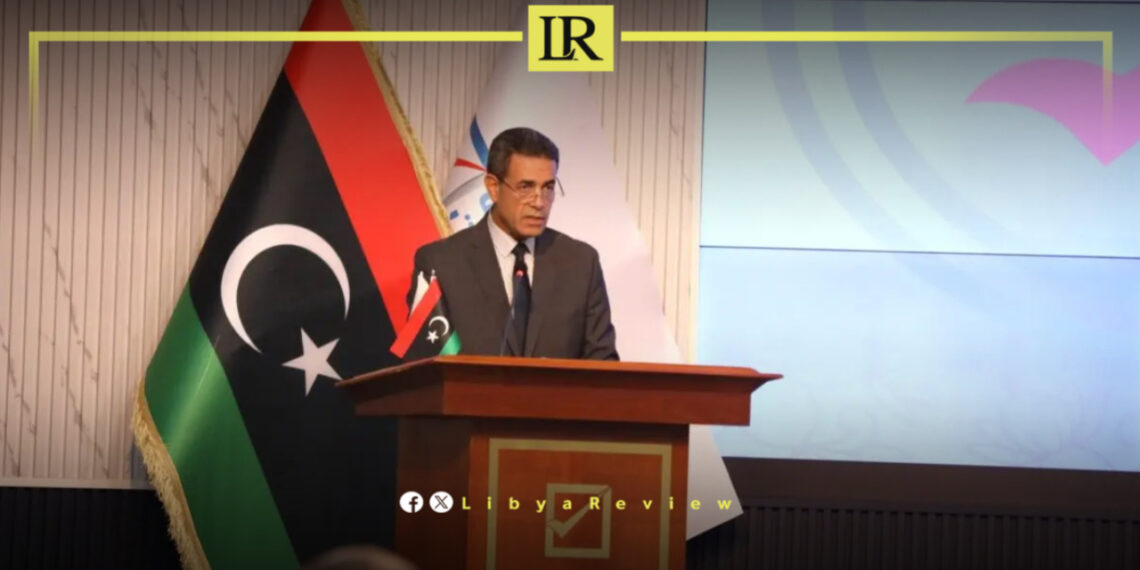The High National Elections Commission (HNEC), in cooperation with the Office of the Public Prosecutor and the UN Development Programme (UNDP), launched a consultative session on Monday, 17 November 2025, focusing on the role of rule-of-law institutions in ensuring a safe electoral environment for women. The event brought together public prosecutors and civil society organisations working on women’s issues at the HNEC Media Centre.
Opening the session, HNEC Chairman Dr. Emad Al-Saih praised the partnership between the Commission and the Office of the Public Prosecutor as essential to safeguarding electoral integrity and credibility. He said the aim of the consultation is to raise awareness within a key segment of the judiciary responsible for representing the public interest, particularly regarding forms of electoral violence targeting Libyan women, its causes, investigative mechanisms, and strategies to reduce its spread.
Al-Saih highlighted statistics showing low levels of women’s participation in elections, rooted in two types of violence. The first, social violence, stems from societal pressures and requires a broad public awareness effort. The second, physical and material violence, demands clear legislative reforms to remove the barriers that hinder women’s political engagement.
In a sharply worded statement, Al-Saih criticised those who question women’s low participation while simultaneously imposing restrictions on half of society. “They raise slogans that do not reflect our society and appear only on certain occasions,” he said, noting that many countries sharing Libya’s cultural background have modernised their laws to restore confidence in women’s roles and their ability to contribute to building resilient families and communities.
He reaffirmed that the Commission adheres to internationally recognised principles and standards — chiefly inclusiveness and credibility — stressing that elections “must include all individuals, groups, and segments of society without exclusion or marginalisation.”
Representing the Office of the Public Prosecutor, Dr. Abeer Abu-Saqq underscored the importance of institutional cooperation to ensure a secure electoral environment for women. She said the Public Prosecutor’s Office is actively monitoring and investigating acts that may limit women’s electoral participation in order to protect their rights and uphold electoral safety. She expressed strong support for HNEC’s efforts to establish a secure electoral framework and encouraged Libyan women to step forward confidently to claim their rights under the law.
HNEC Board Member Rabab Halab presented the latest report from the electronic monitoring platform for combating violence against women in elections. Covering the period from January to June 2025, the report provides an in-depth analysis of digital violence targeting women candidates and political actors.
Halab outlined the methodology used by the (E-Monitor+) platform, which combines quantitative and qualitative tools to measure the scale, patterns, and severity of online violence. The classification system analyses the target category, type of violence, intensity of incitement, and public sentiment.
The findings revealed an alarming 89% rise in digital violence against women compared with the 2024 elections. Facebook was identified as the primary platform hosting violent and hostile content, due to its widespread use and ease of information circulation. The report shows spikes in online harassment and smear campaigns during the nomination and campaign phases, where women frequently face coordinated attacks aimed at undermining their public image.
Halab detailed the psychological and social impact of such violence, warning that it significantly weakens women’s political participation. The report identified the groups most affected, including women in sovereign positions, decision-making roles, political candidates, and women working in government institutions.
She also reviewed HNEC’s response to the findings, including public awareness campaigns on the dangers of digital violence, and enhanced coordination with rule-of-law institutions to reduce its impact and protect women throughout the electoral process.


